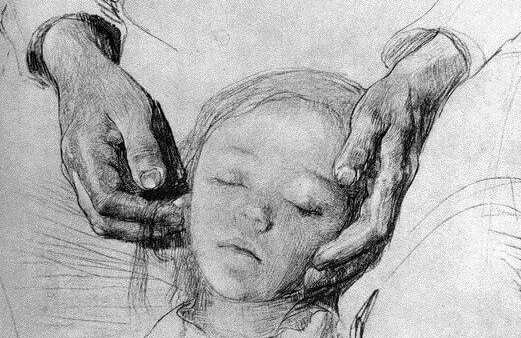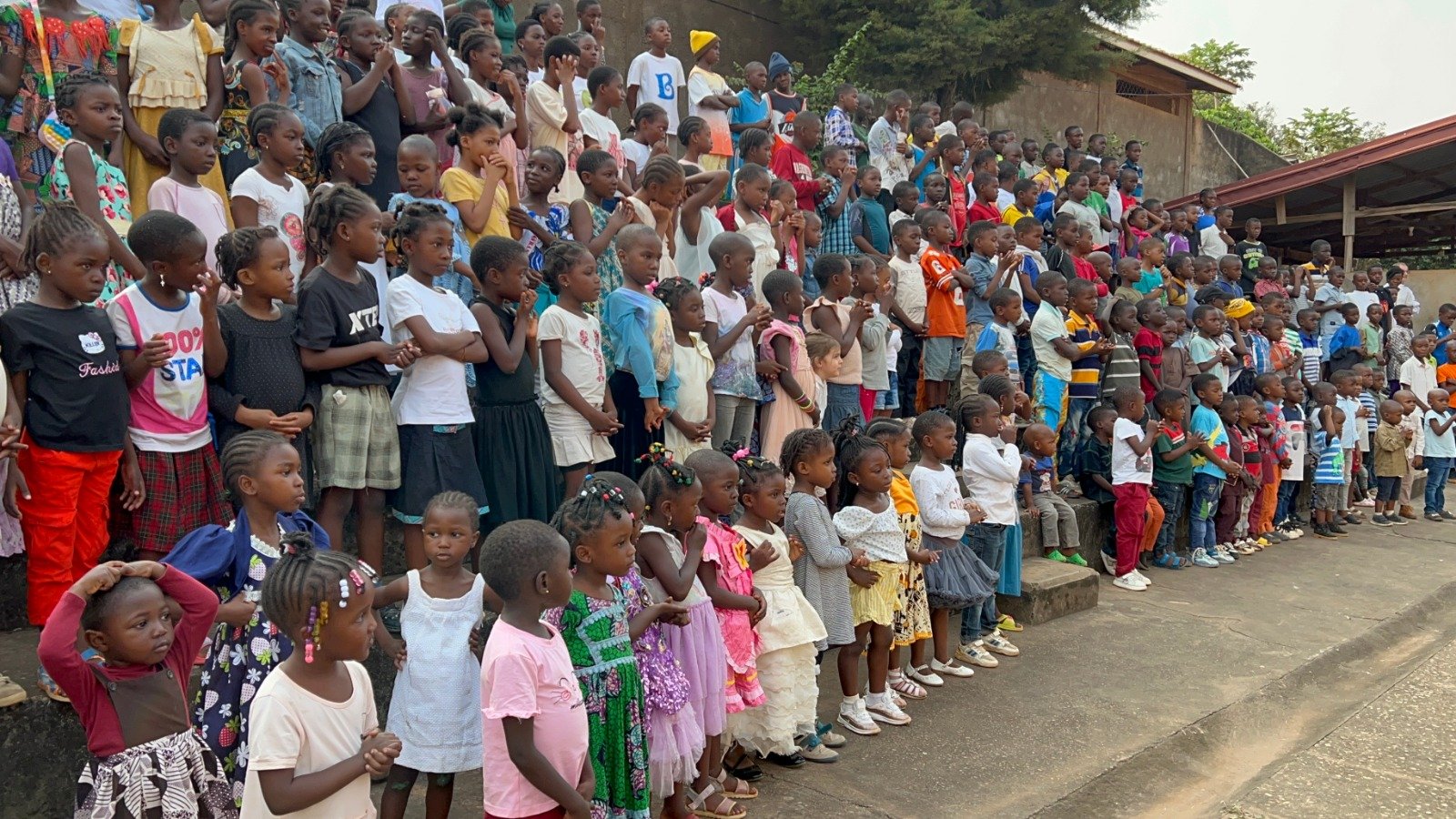
by Luis CASASUS, General Superior of the Idente missionaries.
Lima, November 10, 2019.
Thirty-second Sunday in Ordinary Time.
2nd book of Maccabees 7: 1-2.9-14; 2Thessalonians 2: 16-17.3,1-5; Saint Luke 20: 27-38.
In the hands of God. A phrase we hear in many moments when a person acknowledges that he has no control over the events in his life. A painful example is when someone we love loses his/her vocation.
Particularly when a loved one is very sick or is going to die, or when we feel that our energy and vision are exhausted, we declare that we are in the hands of God, even if shortly before we have been insensitive to his presence.
Many years ago, when our father Founder was being prepared for an extensive surgical operation and he was in the bed-holding area, normally a hostel of heightened anxiety, he greeted the surgeon with pleasantness and a relaxed demeanor; no doubts, no hesitation, only a mellow countenance. And he said (almost his literal words): Doctor, I have put my life and your skills in the hands of God. Once that was done, I stopped worrying because I know he will take care of me, and will guide you. I wish you much success in this surgery.
It is our experience that people with strong faith in God and eternal life are able to go through the experience of pain, sickness and loss with peace and true acceptance.
This is the case of saint Paul in the Second Reading, when he urges the Thessalonians to pray for him, because there are many difficulties that he must confront; there are many people who hate and seek to destroy that which he constructs.
At the other end of the spectrum, it is pretty usual to listen to supposedly unbelievers, friends and relatives, of someone who died: I hope wherever you are, you know that you are truly loved and we hope you find peace and joy.
Today’s Gospel introduces a political-religious group, the Sadducees. They constituted the class of the rich, who were collaborators of the Romans. They were not held in good esteem by the people and from the religious point of view, they were conservatives. All chief priests, who were primarily responsible for the death of Jesus, belonged to this sect.
While the Pharisees belief in the resurrection of the dead, the Sadducees declared themselves skeptics. Moreover, with the money at their disposal, they were willing to enjoy paradise in this world and no one felt any need to dream of afterlife.
Today, the main objection to resurrection for many people comes from some badly digested ideas about neuroscience and evolutionary psychology. Essentially, they argue that the idea of eternal life is just a mechanism of self-deception to alleviate the fear of dying. Of course, their error is to absolutize. Put in simple terms, to confuse one of the consequences with the cause. We believers have to argue properly, using the anthropology of Christ, but also making visible the signs of the contagious peace of God in our lives.
Most of people of primitive times and older cultures endured miserable lives, and looking forward to a better afterlife was completely understandable. This concept was the norm rather than the exception in antiquity. Some cultures have thought about the possibility of a return to the life of this world through a succession of countless reincarnations.
The first books of the Bible show that, in ancient times, the Israelites did not believe in another life. But in the First Reading, we listen to one of the seven brothers: “We are ready to die rather than transgress the laws of our ancestors.” At the point of death, he said: “You accursed fiend, you are depriving us of this present life, but the King of the world will raise us up to live again forever.
Today, we believe, just as Christ teaches us, that we will be reunited with God, the deceased members of our family many people of good will, and this gathering is actually what defines heaven. Our intimacy and love in heaven will be stronger and more intense than ever.
But for most of people, even non-Christians, believe that death is not the final word to life. This desire for immortality, this intuition of eternity, has resulted in a huge variety of religious beliefs and practices throughout the centuries and in every culture in the world.
But for us Christians, the resurrection of Jesus and our resurrection is central to our faith. In Jesus, the age-old question of human beings has been answered: death is not the end. What we call death is the abandonment of the weak, fragile, ephemeral form of life we lead in this world to be welcomed into our Father’s home. The mortal body remains in this world and we are invested with another body incorruptible, glorious, full of strength, spiritual (1 Cor 15:43).
We do not need to be on our deathbed, to reach an “age of understanding” or be abated by a crisis to have a perspective beyond our earthly impressions, to see beyond the pain and the joys. When we believe in and have a foretaste of eternal life, everything acquires a different meaning. And this is important, because our perspective always shapes our pursuits and guides the way we live.
Instead of indulging in speculative questions like the Sadducees, on what kind of body we will have, Jesus was interested in teaching us about the fact that the resurrection constitutes a continuity between the body and the glorified body.
Every separation from those whom we love is heartbreaking, whether in life or in death. This is why the liturgy helps us to understand and prepare for our departure by commemorating those who have gone before us by celebrating All Souls Day and those who have been united with God forever by celebrating All Saints Day.
Jesus’ answer to the Sadducees is: The Lord, the God of Abraham, God of Isaac and the God of Jacob is not God of the dead, but of the living: because all live for him.
He is saying that Moses, who lived many centuries after the death of the patriarchs, calls the Lord: “the God of the patriarchs.” Therefore, they were still alive, otherwise Moses and all the Israelites would have invoked a God of the dead.
God did not make death nor does he rejoice in the destruction of the living (Wis 1:13).
As the fetus in the mother ‘s womb cannot imagine the world that awaits him/her, even so a person is not able to imagine how life will be after leaving this world. We live on earth as a gestation.
It is a mystery that is not revealed, not because God wishes to increase the suspense, but simply because our mind is not able to understand it. We are barely able to know the things of earth, who then may hope to understand heavenly things? (Wis 9:16).
It is said that a disciple asked his Buddhist master: Master is there life after death? The master replied: How can I speak to you about life after death when you do not even understand life before death.
In our Ascetical-Mystical Examination, we share in different ways our anticipated experience of heaven, of eternal life:
* When we are subjected to the mystical purification, we are separated from this world, from worldly life in different ways. This is usually a painful experience, but when we peacefully welcome it, we feel an immediate sense of freedom which provides a foretaste of the glory yet to come, of the perfect joy.
* Inspiration gives us the experience of never losing the feeling of God’s presence, and this is a sign of eternity, a powerful proof that Every relationship, every opportunity, every moment of work, joy, suffering, and rest becomes an opportunity for us to listen to God. He does not give up on us. Everything speaks of God. Everything unveils God to us. Everything becomes heavenly meaningful.
* The gifts of the Holy Spirit constitute evidence not only of the presence of God, but also, and mainly, of his shared action in our lives: we live out a faith, a hope and a love that are not ours but which flow through us as we are emptied of self-interest and prejudices. This is much more significant and decisive than any rational proof of the existence of God.
Reflecting on the death of our beloved ones help us to be more conscious of the shortness of our existence, the fragility of life, the hopes raised and often unfulfilled, the love shared and now shattered and then we see life in its true perspective. We gain a deeper view on the values we really have.
Saint Paul’s faith in the resurrection was what continued to give him hope in all his sufferings. My hope in the eternal life will determine to a large extent my priorities and the way I am going to live my life now.
Our faith in the resurrection makes us not just live for this world alone but in the awareness that what we do here, today, is continued later on in the eternity. That is to say, when we do evil, we bring it with us in the “next life”. This is why we speak about purgatory and hell. Purgatory is a state for those who have failed to love completely in this life and therefore unable to be united with God completely, since they are unable to love God and their fellowmen unconditionally and totally.
Whereas, hell is a place for those who have chosen to live totally closed to the love of God and to others.
In this sense, many of us are already living in hell or in purgatory. Those of us, who are struggling each day to overcome our selfishness, pride and greed, are already in a purgative state, purifying ourselves.
Unless we already begin to live a life of love and generous service for the good of others, we are still unable to get to heaven. The person who loves and serves is, in a sense, already living in heaven on earth. Yes, if we want to be assured of eternal life, let us already begin to live fully for God and others in faith and in love.
As Pope Francis invites us, instead of inquiring about what we are not able to understand, we need to dwell on the certainties that the resurrection of Christ offers, we have to enter into the mystery in particular, the fact that no two lives exist, but one life that continues under two completely different forms.












